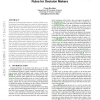Free Online Productivity Tools
i2Speak
i2Symbol
i2OCR
iTex2Img
iWeb2Print
iWeb2Shot
i2Type
iPdf2Split
iPdf2Merge
i2Bopomofo
i2Arabic
i2Style
i2Image
i2PDF
iLatex2Rtf
Sci2ools
122
click to vote
CORR
2011
Springer
2011
Springer
Eliciting Forecasts from Self-interested Experts: Scoring Rules for Decision Makers
Scoring rules for eliciting expert predictions of random variables are usually developed assuming that experts derive utility only from the quality of their predictions (e.g., score awarded by the rule, or payoff in a prediction market). We study a more realistic setting in which (a) the principal is a decision maker and will take a decision based on the expert’s prediction; and (b) the expert has an inherent interest in the decision. For example, in a corporate decision market, the expert may derive different levels of utility from the actions taken by her manager. As a consequence the expert will usually have an incentive to misreport her forecast to influence the choice of the decision maker if typical scoring rules are used. We develop a general model for this setting and introduce the concept of a compensation rule. When combined with the expert’s inherent utility for decisions, a compensation rule induces a net scoring rule that behaves like a normal scoring rule. Assuming ...
| Added | 19 Aug 2011 |
| Updated | 19 Aug 2011 |
| Type | Journal |
| Year | 2011 |
| Where | CORR |
| Authors | Craig Boutilier |
Comments (0)

